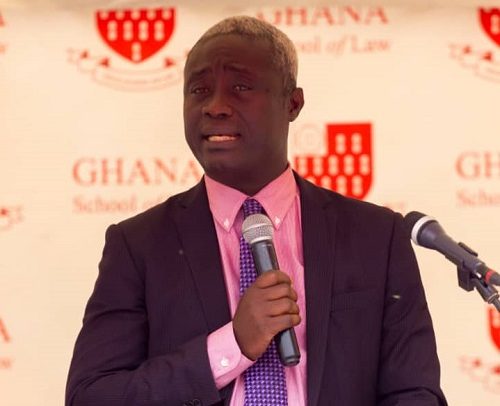Maxwell Opoku Agyeman
A Senior Lecturer of the Ghana School of Law, Maxwell Opoku Agyeman, has called for the collapse of the Ghana School of Law which is the only legal professional training institute in the country.
He said the main consideration was whether or not the law school could be sustained for the next 60 years, and that it was in the interest of the country to collapse the institution because the school could not contain the number of LLB holders produced from the various faculties.
He said the way forward was to convert the school into a Council for Professional Legal Education with departments such as accreditation department, monitoring and evaluation, curriculum development, and independent examination body where faculties would be accredited to offer both the academic and professional courses, and only those accredited institutions would have their students taking the bar examinations which would be organized by the council.
Mr. Opoku Agyeman was speaking at the annual Re-Akoto Lecture of the Ghana Law School on the theme “Sixty years of legal education; challenges and way forward”. It was part of activities lined up for the institution’s 59th SRC week celebration.
He bemoaned that the legal education in the country has become what he called production of examination machines where the only interest of a student was to pass examination, adding “examination must be a secondary matter”.
Mr. Opoku Agyeman noted that it was time to reintroduce the point of making lecturers relevant to their students in the sense that they would be part of examining them and finding out whether they are competent enough in whatever they have taught.
He averred: “The essence of reform is to produce better results. Reform should not take us back and if in this age of ICT we are suffering the way we are, then it is time to think again and look at the reforms”.
Meanwhile the Director of the Ghana School of Law, Henry Kwesi Prempeh-Eck, announced the decision of the Ghana Legal Council to revert to the two-year professional law course beginning next academic year.
He said the two-year course would also include a six-month internship programme before the students are called to the bar, and was designed to afford students practical skills in the profession.
Mr. Prempeh-Eck noted that to eventually deal with the increasing numbers, the management of the GSL has established an emergency implementation committee to advise the school towards preparations for the additional intake of students for the next academic year.
By Abigail Owiredu-Boateng


